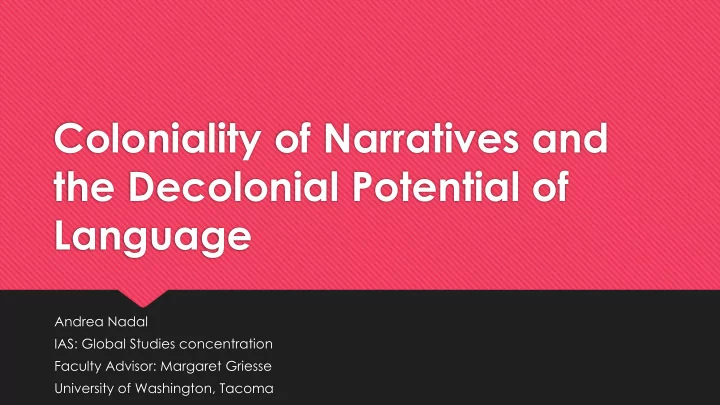

Coloniality of Narratives and the Decolonial Potential of Language Andrea Nadal IAS: Global Studies concentration Faculty Advisor: Margaret Griesse University of Washington, Tacoma
Case Studies America Experience Growing up Second Generation Brazil Mato Grosso do Sul, Brazil - Urban Terena Tribe South Africa Cape Town / Philippi, South Africa - Chrysalis Academy
Theoretical Frameworks Border studies Gloria E. Anzaldu ́ a Languaging Walter Mignolo
Second Generation I am of Puerto Rican and Anglo Descent: • My father came to America from Puerto Rico • in grade school. Learned English after coming to America • My mother is White American • Only speaks English • Image Description: My brother and I in Puerto Rico, the only time I have set foot on the Archipelago. Age 12.
Urban Terena Tribe Urban Reservation: • Figuratively and literally at the • border Physical Border: • Situated within a Brazilian • town Border between languages: • Image Description: Painting in the Reservation: community area of the Reservation. • Terena Language • Town: • Portuguese •
Chrysalis Academy Job Skill Training Academy: • Border between Languages & Culture • – Home & Academy Home: IsiXhosa, IsiZulu, Afrikaans • Connection to family & • culture, as well as history Academy: English • Image Description: Staff from the Movement, free of a burden of • Academy and my Study Abroad history group on Introduction day for the students. On this day all of the staff wears the uniform as a show of solidarity.
Solution Language does not need to be attached to a particular geographical space, it does not need to belong to a single people We can begin to decolonize languages in this way There is power in subversion, and in claiming one’s positionality Create Language as your own, in spite of its history or origin
Recommend
More recommend